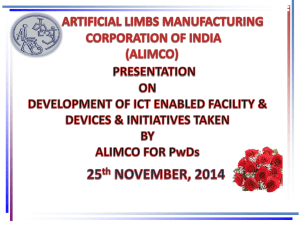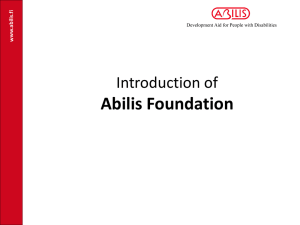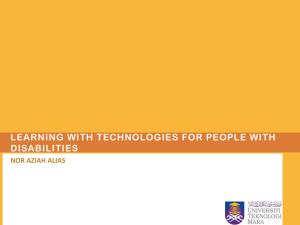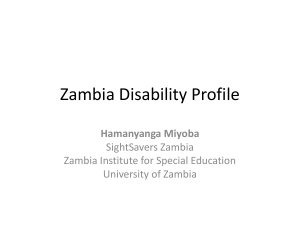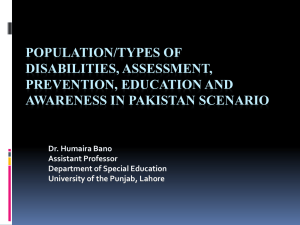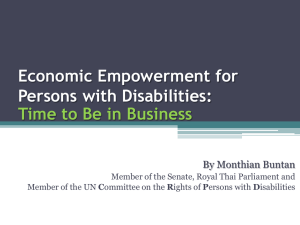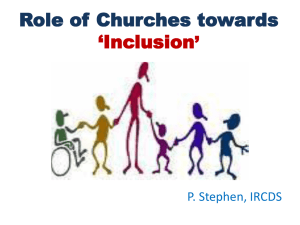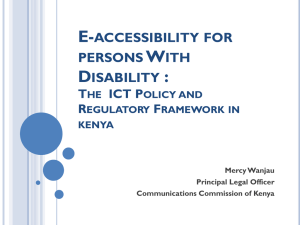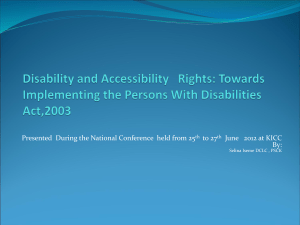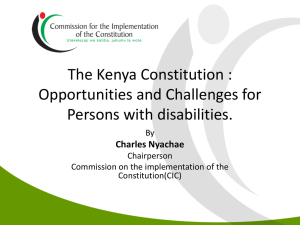Equal Opportunities Commission
advertisement
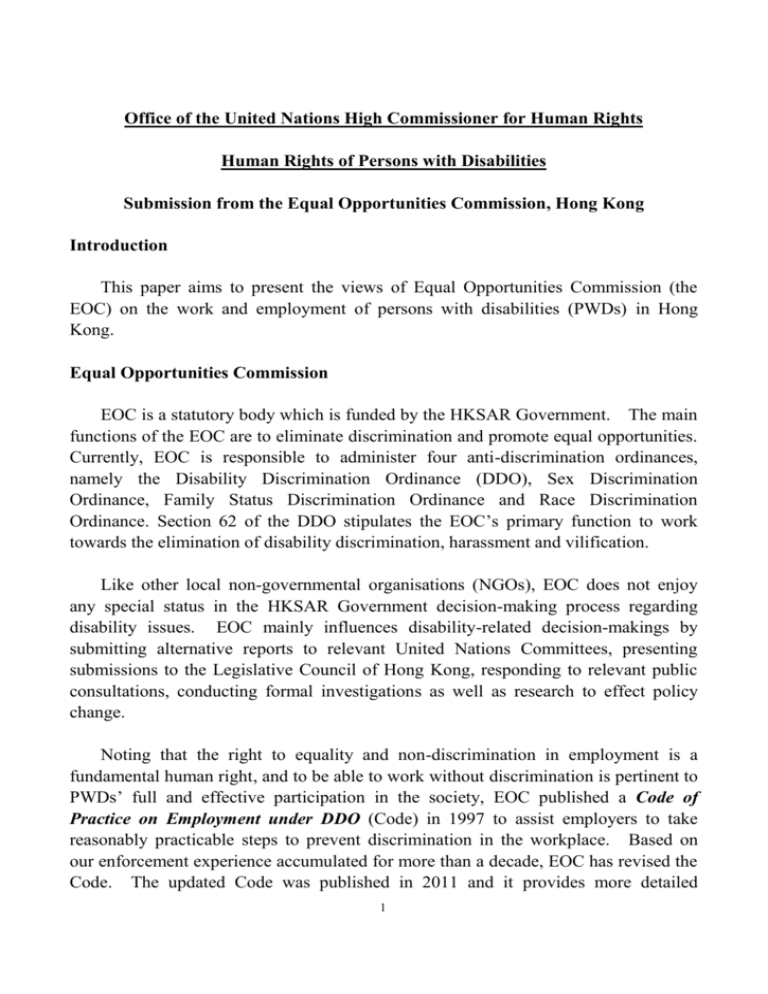
Office of the United Nations High Commissioner for Human Rights Human Rights of Persons with Disabilities Submission from the Equal Opportunities Commission, Hong Kong Introduction This paper aims to present the views of Equal Opportunities Commission (the EOC) on the work and employment of persons with disabilities (PWDs) in Hong Kong. Equal Opportunities Commission EOC is a statutory body which is funded by the HKSAR Government. The main functions of the EOC are to eliminate discrimination and promote equal opportunities. Currently, EOC is responsible to administer four anti-discrimination ordinances, namely the Disability Discrimination Ordinance (DDO), Sex Discrimination Ordinance, Family Status Discrimination Ordinance and Race Discrimination Ordinance. Section 62 of the DDO stipulates the EOC’s primary function to work towards the elimination of disability discrimination, harassment and vilification. Like other local non-governmental organisations (NGOs), EOC does not enjoy any special status in the HKSAR Government decision-making process regarding disability issues. EOC mainly influences disability-related decision-makings by submitting alternative reports to relevant United Nations Committees, presenting submissions to the Legislative Council of Hong Kong, responding to relevant public consultations, conducting formal investigations as well as research to effect policy change. Noting that the right to equality and non-discrimination in employment is a fundamental human right, and to be able to work without discrimination is pertinent to PWDs’ full and effective participation in the society, EOC published a Code of Practice on Employment under DDO (Code) in 1997 to assist employers to take reasonably practicable steps to prevent discrimination in the workplace. Based on our enforcement experience accumulated for more than a decade, EOC has revised the Code. The updated Code was published in 2011 and it provides more detailed 1 explanation on the key legal concepts in the DDO, with abundant case illustrations to help readers understand its practical application. Physical access hinders PWDs’ equal participation in economic and public life. Accessible physical environment/ premise is essential for independent living of PWDs, and it is also a major area of concern for the EOC. In December 2006, in accordance with section 66 of the DDO, the EOC launched a formal investigation to examine the means of access to or use of premises and facilities owned or managed by the public sector and the HKSAR Government. The investigation has identified shortfalls in various aspects of accessibility. In response to the findings of the formal investigation, the HKSAR Government has committed to upgrade barrier-free facilities in about 4,000 government as well as public premises and facilities. Accessible public transport service is also vital to PWDs, in particular the employees with disabilities. Since some public franchised buses in Hong Kong are still inaccessible to the PWDs, EOC has requested the HKSAR Government to take relevant measures to enhance the public bus services are accessible to all people, irrespective of their disabilities. In response to our suggestions, the HKSAR Government has introduced a new clause in the franchise for franchised bus companies, and it empowers the Commissioner for Transport of the HKSAR Government to require the public bus operators to adopt barrier-free and elderly-friendly features on all new buses. It is considered an important step forward as the HKSAR Government committed to take more action to enhance accessible franchised bus services in Hong Kong. Employment of persons with disabilities in Hong Kong Basic data and statistics According to the Special Topic Report No. 48 – Persons with disabilities and chronic diseases published by the Census and Statistics Department of the Hong Kong Special Administrative Region (HKSAR) Government in 2008, the unemployment rate of PWDs in 2007 was 10.5% or 2.6 times of the overall prevalent unemployment rate of 4%. Moreover, the median monthly employment earning of PWDs in 2007 was HK$6,800 as against $10,100 for the total employed population. Services provided by the Government to enhance employment of PWDs 2 Generally speaking, the HKSAR Government recognizes the rights of PWDs to work on an equal basis with others as stipulated in Article 27 of the Convention on the Rights of Persons with Disabilities. The HKSAR Government has taken appropriate measures by providing a range of employment and vocational rehabilitation services for PWDs to promote the employment of PWDs and vocational training to equip them with the relevant job skills that meet open market requirements and assist them in securing suitable employment commensurate with their abilities. These services include the following: Employment Service The Labour Department of the HKSAR Government provides one-stop free recruitment services to employers and employment services to job seekers with disabilities under the Selective Placement Division (the Division). Employers can place vacancies and conduct candidates search to recruit suitable staff with the help of the Division. They can join the Work Orientation and Placement Scheme, where financial incentives and certificates of appreciation are offered as positive encouragement. Job seekers with disabilities may register for jobs, conduct job search and enjoy a full set of job matching, referral and follow-up services at the Division. They can also obtain vocational guidance, assessment and the latest information on local labour market from the Division in order to find open employment jobs that best suit their abilities and the needs of the market. Enhancing Employment of PWDs through Small Enterprise Project In the 2011-12 Policy Address delivered by the Chief Executive of HKSAR Government, the government acknowledges that some PWDs have considerable difficulties securing employment. To strengthen support for PWDs, the Social Welfare Department (SWD) of the HKSAR Government has launched the “Enhancing Employment of People with Disabilities through Small Enterprises” Project by granting funding for NGOs to set up small enterprises employing PWDs. The HKSAR Government will inject HK $100 million into the project to create more jobs for PWDs. In addition, the HKSAR Government plans to provide a subsidy from 2012 onwards for employers of PWDs to purchase technical aids and modify work areas to boost the efficiency of employees with disabilities. 3 Vocational Training Under the SWD, sheltered workshops, integrated vocational rehabilitation services centres, supported employment service and integrated vocational training centres are providing various rehabilitation services for PWDs who are not ready for open market. These training opportunities will help enhance the working capacity of PWDs and facilitate their participation in open employment. Apart from providing employment training to PWDs, the HKSAR Government also provides employers with wage subsidy to encourage their employment of PWDs. The Employees Retraining Board provides a variety of placement-tied vocational training courses for unemployed PWDs aged 15 or above with education attainment of sub-degree or below. These courses provide job-specific skills training covering various industry categories such as integrated business, retail, catering, information technology, etc. These courses help trainees enhance their employability and readiness to participate in the job market. Legislative and policy framework related to work and employment of PWDs Local legislations related to PWDs Currently, there are only two pieces of domestic legislation directly relating to the the rights of PWDs – the DDO and the Mental Health Ordinance (MHO). The DDO aims to protect and promote the rights of PWDs in the fields of employment as well as education, provision of goods, service and facilities etc.. As explained in the above, EOC is responsible to administer this piece of legislation. Since the implementation of the DDO, Hong Kong has made significant progress in arousing public awareness and enhancing protection of the rights of PWDs. The MHO, which was drafted mainly from a medical/management perspective, governs the care, supervision, management of property and affairs, reception, detention, treatment and release of persons with mental illnesses. Although the HKSAR Government has taken a step forward to promoting mental health and providing one-stop service to improve case management for mental and psychiatric patients, mental health is still approached as solely a health and welfare matter. In fact, mental health is influenced by a matrix of factors which fall beyond the scope and purview of the medical and health sector. Policies related to employment, education, housing, economics, urban planning and criminal justice should be 4 formulated in a way that promotes mental health. Failing to consider the importance of wider civil, political, economic, social and cultural rights of persons with mental illnesses will reduce the effects and outcomes of mental health services. EOC and NGOs therefore advocate the setting up of a Mental Health Commission (MHC). The proposed MHC will be responsible to co-ordinate and monitor the formulation and implementation of policies and action plans relating to persons with mental illnesses. It is discouraging that the HKSAR Government is reluctant to set up the proposed MHC. The HKSAR Government should seriously reconsider the proposal and amend the MHO so as to make it in line the global trend of deinstitutionalization, normalization and integration of people with mental illness. Commissioner for Rehabilitation The Commissioner for Rehabilitation (C for R) of the HKSAR Government is responsible for the formulation of the overall policy in rehabilitation and welfare matters for PWDs, and for co-ordinating and facilitating all government departments, public organisations and NGOs in the development and provision of rehabilitation services. While C for R is a senior government officer under the Labour and Welfare Bureau (LWB) of the HKSAR Government, there are concerns about the limited authority of the C for R to promote the implementation of the Convention in various government policy bureaux and departments due to the fact that he is just a junior directorate ranking officer in the Government structure. Moreover, there are also concerns on the co-ordinating role of C for R because NGOs still have to deal with different government policy branches and departments from different fronts for different issues relating to the rights of PWDs. To ensure government’s compliance with the provisions relating to the rights of PWDs under the Convention on the Rights of Persons with Disabilities (the Convention), it is suggested that the central co-ordinating role of the LWB and the C for R to facilitate the mainstreaming of the rights of PWDs in the formulation and implementation of government’s policies, plans and programmes should be strengthened. Besides, the C for R should also take a more proactive approach in collaborating with NGOs to promote the implementation of the rights of PWDs stipulated in the Convention. Rehabilitation Advisory Committee Rehabilitation Advisory Committee (RAC) is an advisory body to the HKSAR 5 Government on matters pertaining to the well-being of PWDs and the development of and implementation of rehabilitation policies and services. With the application of the Convention to Hong Kong, the RAC also advises the HKSAR Government on the promotion and monitoring of the implementation of the Convention in Hong Kong. It is found that a relatively small number of the members of the RAC and its Sub-Committee on Access are PWDs, and no institutional representation of the NGOs for PWDs. To strengthen the functions of the RAC, the HKSAR Government should invite more PWDs, their representative organisations to join the RAC, and consult them in the decision-making process concerning issues relating to the promotion and protection of the rights of PWDs to work. Labour Advisory Boards and related Committee The Labour Advisory Board (LAB) is a non-statutory body to advise the Commissioner for Labour of HKSAR Government on labour matters. The Commissioner for Labour is the chairperson of the LAB. The LAB has 12 unofficial members, six representing employers and six representing employees. Under the LAB, there is a Committee on Employment Services (the Committee). One of the terms of reference of the Committee is to advise on the employment services provided by the Labour Department, including those for the able-bodied and PWDs. According to the Membership list for 2011-2012, it appears that there is only one representative of PWDs sitting in the Committee. Given the small number of PWDs in the LAB and Committee, it is doubtful that the views of the PWDs can be fully reflected during the formulation of policies related to the employment of PWDs. To further enhance the rights of the PWDs in employment, the HKSAR Government should invite more PWDs to join the LAB and relevant Committee so that the views and concerns of the PWDs can be considered in the formulation of relevant policies. Statutory minimum wage The Minimum Wage Ordinance (MWO) became effective in May 2011, and it is widely recognized as an important milestone in the development of employment policy in Hong Kong as it provides statutory wage protection to all employees, including employees with a disability. To protect PWDs who are less competitive in the open workforce, special arrangement is made to assess the productivity of individual employee who has a disability in the authentic workplace in order to help to determine whether the individual should be remunerated at no less than the statutory minimum wage rate, and if not, the extent of discount. In order to forestall abuse by 6 employers, the right to invoke such assessment is vested with the employee who claims to have a disability. While MWO has provided a certain degree of protection for PWDs in the competitive open labour market, section 24(3) of the ordinance stipulates that the employer is not considered as contravening the DDO when “an employer dismissing a person with a disability on account of the outcome of an assessment made under Schedule 2 of the Minimum Wage Ordinance.” In the absence of any review mechanism for the assessment outcome of the productivity of the PWDs, it is generally considered that the above provision might be abused by employers as employees with disabilities could be dismissed without any reasonable cause after the productivity assessment. To protect the rights of employees with disabilities, the HKSAR Government should consider establishing a review mechanism for the outcome of the productivity assessment, and PWDs can have the channel to appeal against the outcome of the assessment. It is crucial to monitor its impact of MWO on PWDs in the labour market so that appropriate policies can be formulated to further enhance the equal employment opportunity of the PWDs. However, there is a lack of basic data on the employment profile of the PWDs before and after the implementation of the ordinance. Hence, the HKSAR Government should put in place an appropriate data collection system and disseminate key statistics relating to the employment of PWDs in the labour market on a regular basis so that the effect of MWO on the employment of PWDs can be monitored and assessed. Statistics and data collection As discussed in the above, the Census and Statistics Department of the HKSAR Government had conducted survey on PWDs and persons with chronic diseases in 2006-07 and the survey results were published in the Special Topic Report No. 48 which was released in December 2008. In view of that fact that the above survey was conducted about 5 years ago, the HKSAR Government should conduct new and timely statistical surveys on the employment situation of PWDs to collect updated statistical data on PWDs and gauge the effectiveness of the implementation of existing policies and measures as well as address the barriers encountered by PWDs in exercising their rights. Conclusion 7 To set a good example in complying with the requirements of the Convention, the HKSAR Government should take measures to mainstream the disability issues during the process of policy formulation and programme implementation in order to protect the employment rights of the PWDs. Meanwhile, the HKSAR Government should work closely with the private sectors in promoting the employment of PWDs. Through the concerted efforts of the government and private sectors, all people, regardless of their disabilities, can enjoy the right to work on equal basis. Equal Opportunities Commission July 2012 8
